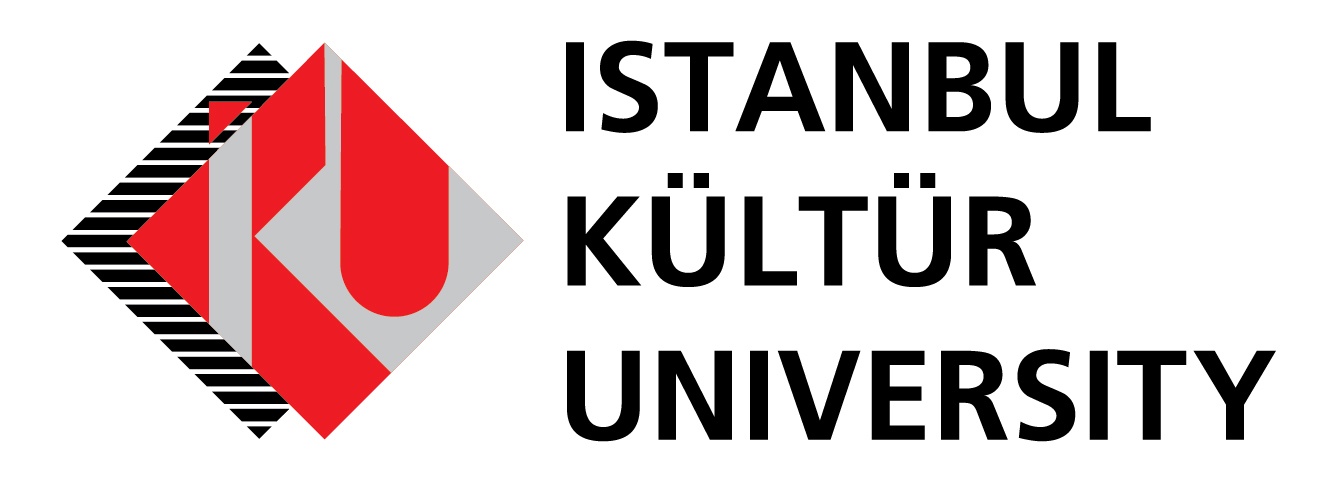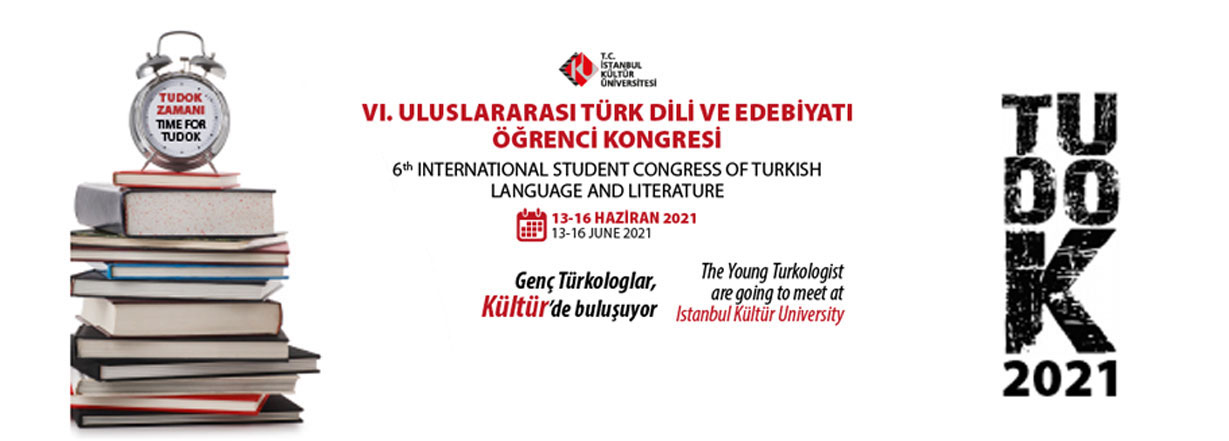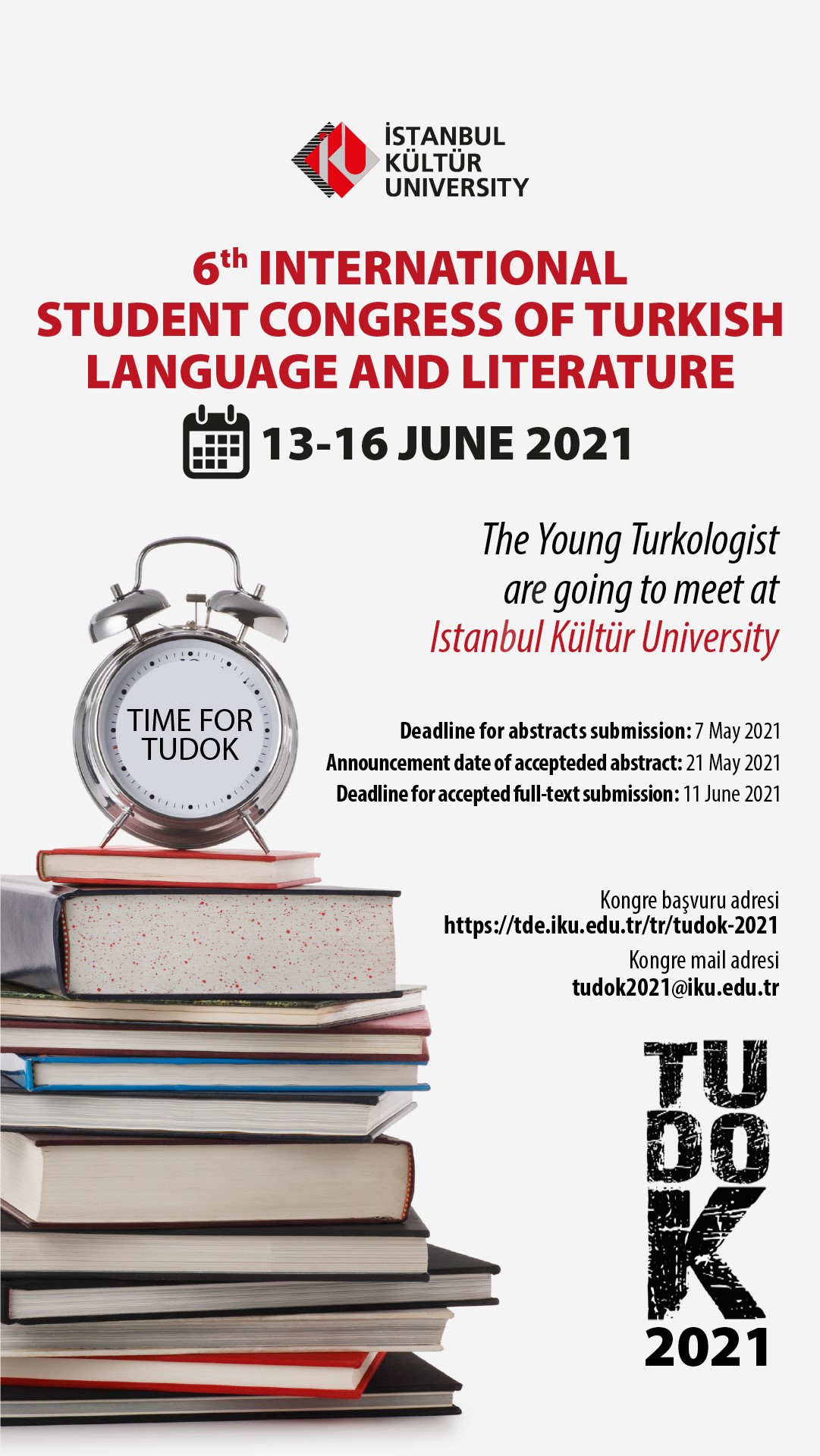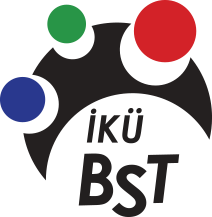TUDOK 2021
Important Dates
| Congress Dates | 13-16 JUNE 2021 |
| Deadline | 7 May 2021 |
| Deadline for Abstract Submission | 7 May 2021 |
| Notification of Acceptance | 21 May 2021 |
| Deadline for Full Text Submission | 11 June 2021 |
TUDOK-2021 aims to enable graduate students who study in Turkey and foreign countries to present their scientific findings in an international setting, and publish them to publicize their unique research in every department associated with the Turkish Language and Literature field, while providing a space for each participant to interact with each other and experienced academics of the field.
TUDOK-2021 is open to Turkish and International Turkology, Turkish Language and Literature, Turkish Literature, Folklore, Modern Turkish Dialects, Turkish Language and Literature Education, Turkish Education departments, along with all students of other departments with topics related to the congress’ aim.
Applications are made by filling out and sending the participation form on our website. Submitted abstracts are sent to two of the academic members who are qualified in that subject in the Scientific Committee. The authors of the abstracts whose presentations are deemed appropriate will be announced on our website between the announcement dates.
The congress will be held online. You will be informed about how to participate on our website.
There is no fee for participation.
We would like to thank our former head of the department Prof. Dr. Ömür Ceylan, the mastermind behind TUDOK and the organizer of the first five congresses, and his team for this beautiful legacy they left.
We would also like to thank the valuable members of the scientific committee who attended the previous congresses to evaluate, guide and lead the young participants, along with the presenters some of whom have now become professors.
In all of the previous TUDOKs, congress papers were printed as a book and sent to the participants, therefore publicizing the attendee’s scientific findings.
ORGANIZING COMMITTEE
- Prof. Dr. M. Fatih KÖKSAL (İstanbul Kültür Uni., Turkey)
- Prof. Dr. Vahit TÜRK (İstanbul Kültür Uni., Turkey)
- Prof. Dr. Hayati DEVELİ (İstanbul Uni., Turkey)
- Prof. Dr. İskender PALA (İstanbul Kültür Uni., Turkey)
- Prof. Dr. Ömür CEYLAN (İzmir Katip Celebi Uni., Türkiye)
- Prof. Dr. Mehmet AÇA (Marmara Uni., Turkey)
- Prof. Dr. Muharrem KAYA (Mimar Sinan Fine Arts Uni., Turkey)
- Asst. Prof. Emre Berkan YENİ (İstanbul Kültür Uni., Turkey)
- Asst. Prof. Kayhan ŞAHAN (İstanbul Kültür Uni., Turkey)
- Asst. Prof. İbrahim KOLUNSAĞ (İzmir Katip Celebi Üni., Türkiye)
- Asst. Prof. Mehmet TÜRKMEN (İstanbul Kültür Uni., Turkey)
- Asst. Prof. Negihan GÜR (Ankara Social Sciences Uni., Turkey)
- Asst. Prof. Onur HASDEDEOĞLU (Kastamonu Uni., Türkiye)
- Asst. Prof. Yağız YALÇINKAYA (İstanbul Kültür Uni., Turkey)
- Instructor İsa KOCAKAPLAN (İstanbul Kültür Uni., Turkey)
- Research Assistant Harun COŞKUN (İstanbul Kültür Uni., Turkey)
- Research Assistant Çağla BARİKAN TOPCİ (İstanbul Kültür Uni., Turkey)
- Research Assistant Güler UĞUR (İstanbul Kültür Uni., Turkey)
- Research Assistant Berna CİVALIOĞLU SEVİNDİK (İstanbul Kültür Uni., Turkey)
SCIENCE BOARD
(CLASSICAL TURKISH LITERATURE)
- Prof. Dr. Ahmet KARTAL (Osmangazi Uni., Turkey)
- Prof. Dr. Ali İhsan ÖBEK (Trakya Uni., Turkey)
- Prof. Dr. Bahir SELÇUK (Elazığ Fırat Uni., Turkey)
- Prof. Dr. Benedek PERİ (Eötvös Lorand Uni., Hungary)
- Prof. Dr. Beyhan KESİK (Giresun Uni., Turkey)
- Prof. Dr. Edith G. AMBROS (University of Wien, Austria)
- Prof. Dr. Fatma Sabiha KUTLAR (Hacettepe Uni., Turkey)
- Prof. Dr. Günay KUT (Boğaziçi Uni. Ret., Turkey)
- Prof. Dr. Hanife KONCU (Mimar Sinan Güzel Sanatlar Uni., Turkey)
- Prof. Dr. Hasan ŞENER (Ankara Hacı Bayram Veli Uni, Turkey)
- Prof. Dr. İsmail Hakkı AKSOYAK (Ankara Hacı Bayram Veli Uni., Turkey)
- Prof. Dr. Layli ÜKÜBAYEVA (Manas Üni., Kyrgyzstan)
- Prof. Dr. Muhsin MACİT (Anadolu Uni., Turkey)
- Prof. Dr. Mustafa İSEN (Gazi Uni. Ret., Turkey)
- Prof. Dr. Mücahit KAÇAR (İstanbul Uni., Turkey)
- Prof. Dr. Müjgan ÇAKIR (Mimar Sinan Güzel Sanatlar Uni., Turkey)
- Prof. Dr. Nihat ÖZTOPRAK (Fatih Sultan Mehmet Vakıf Uni., Turkey)
- Prof. Dr. Orhan Kemal TAVUKÇU (Recep Tayyip Erdoğan Uni., Turkey)
- Prof. Dr. Orhan KURTOĞLU (Ankara Hacı Bayram Veli Uni., Turkey)
- Prof. Dr. Osman HORATA (Hacettepe Uni., Turkey)
- Prof. Dr. Ozan YILMAZ (Sakarya Uni., Turkey)
- Prof. Dr. Özer ŞENÖDEYİCİ (Çorum Hitit Uni., Turkey)
- Prof. Dr. Rıfat KÜTÜK (Atatürk Uni., Turkey)
- Prof. Dr. Sadık YAZAR (İstanbul Medeniyet Uni., Turkey)
- Prof. Dr. Seadet ŞIHIYEVA (Azerbaijan Uni., Azerbaijan)
- Prof. Dr. Sebahat DENİZ (Marmara Uni., Turkey)
- Prof. Dr. Semra TUNÇ (Selçuk Uni., Turkey)
- Prof. Dr. Yaşar AYDEMİR (Gazi Uni., Turkey)
(MODERN TURKISH LITERATURE)
- Prof. Dr. Abide Doğan (Hacettepe Uni., Turkey)
- Prof. Dr. Abdullah Şengül (Nevşehir Hacı Bektaş Veli Uni. Turkey)
- Prof. Dr. Ahmet BOZDOĞAN (Sivas Cumhuriyet Uni., Turkey)
- Prof. Dr. Ali Şükrü ÇOLUK (İstanbul Uni., Turkey)
- Prof. Dr. Ayşe Emel KEFELİ (İstanbul 29 Mayıs Uni., Turkey)
- Prof. Dr. Beyhan KANTER (Mardin Artuklu Uni., Turkey)
- Prof. Dr. İbrahim ŞAHİN (Eskişehir Osmangazi Uni., Turkey)
- Prof. Dr. İbrahim TÜZER (Ankara Yıldırım Beyazıt Uni., Turkey)
- Prof. Dr. İsmet EMRE (Ankara Hacı Bayram Veli Uni., Turkey)
- Prof. Dr. M. Fatih KANTER (Kilis 7 Aralık Uni., Turkey)
- Prof. Dr. Nâzım H. POLAT (Ankara Hacı Bayram Veli Uni., Turkey)
- Prof. Dr. Nurullah ÇETİN (Ankara Uni., Turkey)
- Prof. Dr. Ramazan KORKMAZ (Maltepe Uni., Turkey)
- Prof. Dr. Süheyla YÜKSEL (Cumhuriyet Uni., Turkey)
- Prof. Dr. Şahika KARACA (Eskişehir Osmangazi Uni., Turkey)
- Prof. Dr. Şuayip KARAKAŞ (İstanbul Aydın Uni., Turkey)
- Prof. Dr. Ülkü ELİUZ (Karadeniz Tecnical Uni., Turkey)
(TURKISH FOLK LITERATURE / FOLKLORE)
- Prof. Dr. Abdulkadir EMEKSİZ (İstanbul Uni., Turkey)
- Prof. Dr. Ali DUYMAZ (Balıkesir Uni., Turkey)
- Prof. Dr. Ali TORUN (Kütahya Dumlupınar Uni., Turkey)
- Prof. Dr. Ali YAKICI (Gazi Uni., Turkey)
- Prof. Dr. Aynur KOÇAK (Yıldız Tecnical Uni., Turkey)
- Prof. Dr. Bayram DURBİLMEZ (Erciyes Uni., Turkey)
- Prof. Dr. Esma ŞİMŞEK (Fırat Uni., Turkey)
- Prof. Dr. Eyüp AKMAN (Kastamonu Uni., Turkey)
- Prof. Dr. Halil Altay GÖDE (Süleyman Demirel Uni., Turkey)
- Prof. Dr. İsmail GÖRKEM (Erciyes Uni. Ret., Turkey)
- Prof. Dr. İsmet ÇETİN (Gazi Uni., Turkey)
- Prof. Dr. Kürşat ÖNCÜL (Eskşehir Osmangazi Uni., Turkey)
- Prof. Dr. M. Öcal OĞUZ (Ankara Hacı Bayram Veli Uni., Turkey)
- Prof. Dr. Mehmet ÇERİBAŞ (Nevşehir Hacıbektaş Veli Uni., Turkey)
- Prof. Dr. Mehmet EROL (Gaziantep Uni., Turkey)
- Prof. Dr. Metin EKİCİ (Ege Uni., Turkey)
- Prof. Dr. Metin ÖZARSLAN (Hacettepe Uni., Turkey)
- Prof. Dr. Nedim BAKIRCI (Niğde Ömer Halisdemir Uni., Turkey)
- Prof. Dr. Özkul ÇOBANOĞLU (Hacettepe Uni., Turkey)
- Prof. Dr. Pervin ERGUN (Ankara Hacı Bayram Veli Uni., Turkey)
- Prof. Dr. Ruhi ERSOY (Ankara Hacı Bayram Veli Uni., Turkey)
- Prof. Dr. Salahaddin BEKKİ (Kırşehir Ahi Evran Uni., Turkey)
- Prof. Dr. Şahin KÖKTÜRK (Samsun Ondokuz Mayıs Uni., Turkey)
(TURKISH LANGUAGE)
- Prof. Dr. Abdullah KÖK (Akdeniz Uni., Turkey)
- Prof. Dr. Ahmet BURAN (Fırat Uni., Turkey)
- Prof. Dr. Ali AKAR (Muğla Sıtkı Koçman Uni., Turkey)
- Prof. Dr. Asiye Mevhibe COŞAR (Karadeniz Tecnical Uni., Turkey)
- Prof. Dr. Ayşe İLKER (Celal Bayar Uni., Turkey)
- Prof. Dr. Bilal YÜCEL (Sivas Cumhuriyet Uni., Turkey)
- Prof. Dr. Bilgehan Atsız GÖKDAĞ (Kırıkkale Uni., Turkey)
- Prof. Dr. Cengiz ALYILMAZ (Bursa Uludağ Uni., Turkey)
- Prof. Dr. Ercan ALKAYA (Elazığ Fırat Uni., Turkey)
- Prof. Dr. Erden HACIBEK (Al-Farabi Kazakh National Uni., Kazakistan)
- Prof. Dr. Fatih KİRİŞÇİOĞLU (Ankara Hacı Bayram Veli Uni., Turkey)
- Prof. Dr. Feridun CELİLOV (Azerbaijan)
- Prof. Dr. Funda TOPRAK (Ankara Yıldırım Beyazıt Uni., Turkey)
- Prof. Dr. Galip GÜNER (Erciyes Uni., Turkey)
- Prof. Dr. Gürer GÜLSEVİN (Ege Uni., Turkey)
- Prof. Dr. Hatice ŞAHİN (Bursa Uludağ Uni., Turkey)
- Prof. Dr. Hülya Arslan EROL (Gaziantep Uni., Turkey)
- Prof. Dr. Julibay ELTAZAROV (Semerkand İpek Yolu Uluslararası Tur. Uni., Özbekistan)
- Prof. Dr. Kemal YAVUZ (Fatih Sultan Mehmet Vakıf Uni., Turkey)
- Prof. Dr. Murat CERİTOĞLU (İzmir Katip Çelebi Uni., Turkey)
- Prof. Dr. Murodqosim ABDIYEV (Semerkand Devlet Uni., Özbekistan)
- Prof. Dr. Mustafa ARGUNŞAH (Erciyes Uni., Turkey)
- Prof. Dr. Mustafa ÖNER (Ege Uni., Turkey)
- Prof. Dr. Nevzat ÖZKAN (Erciyes Uni., Turkey)
- Prof. Dr. Serkan ŞEN (Ondokuz Mayıs Uni., Turkey)
- Prof. Dr. Şaban DOĞAN (İzmir Katip Çelebi Uni., Turkey)
- Prof. Dr. Yavuz KARTALLIOĞLU (Ankara Hacı Bayram Veli Uni., Turkey)
Page Layout
1. The articles should be written in Microsoft Word software and the page layout should be regulated as the following:
| Paper Size | A4 Portrait |
| Top Margin | 3 cm |
| Bottom Margin | 2.5 cm |
| Left Margin | 2.5 cm |
| Right Margin | 2.5 cm |
| Paragraph indentation | 0.5 cm |
| Block Quotation from right and left sides | 3.5 cm |
| Typefont | Times New Roman |
| Font Style | Normal |
| Font size | 12 pt |
| Footnote | 10 pt |
| Verse quotation | 2 cm indent from the left |
| Footnote text size | 10 pt |
| Paragraph Break | 6 nk (after) |
| Row Pitch | 1,15 |
| Text must be justified | |
2. Details such as page number, header and footer should not be included in the articles.
Abstract section should be Times New Roman, font style is normal, font size is 10 pt, the first line should be indented 0.75 cm and right margin and left margin indents should be 1 cm. The Turkish and English abstract chapters should be included a Turkish and English abstract between 150-250 words and Turkish and English keywords of 3-5 words together with the title.
3. Sub-headings can be used to provide clarity and cohesion. Main titles (main section, sources, and appendices) should be capitalized; sub-headings should be written in bold and capital letters only.
4. In terms of spelling and punctuation, except for special cases required by the article or the subject, The Spelling Guide of the Turkish Language Institution should be taken as the basis.
CITATION AND BIBLIOGRAPHY GUIDE
The APA citation manual should be used in the papers that will be sent to "the International Student Congress of Turkish Language and Literature”. For this reason, the articles to be sent should conform to the citation guidelines shown below.
GENERAL RULES
1. A period is put between each independent information that comes after the date in all work tag (book, thesis, article, paper, etc.) shown in the bibliography. Comma is used only after the surname of the author: Orkun, Hüseyin Namık (1986). Eski Türk Yazıtları. Ankara: Türk Dil Kurumu Yayınları.
2. Footnotes can also be used in cases where explanations are required in the text.
3. If a reference is to be made in the footnote, the citation system within the text is also applied: “For the main studies on this subject, see. (Ünver 1986; Timurtaş, 1994)”
4. If the name of the author is mentioned in the text, the name of the author should not be repeated: “Hence, Bahattin Ögel (1991: 118) has notable findings on this.”
5. Translator (çev.), dedicator (tsh.), prepared by (haz.) etc. In these cases, when writing these names, a period should be put after the name of the work and the name of the person should be given with the relevant abbreviation in parentheses.
1. Citation from a book
For single author books:
In text: (Timurtaş, 1972: 78)
In bibliography: Timurtaş, Faruk Kadri (1972). Yunus Emre Divanı. İstanbul: Tercüman Yayınları.
For books with two authors:
In text: (Ercilasun ve Akkoyunlu, 2014: 102)
In bibliography: Ercilasun, Ahmet Bican-Ziyat Akkoyunlu (2014). Dîvânü Lügâti’t-Türk – Kâşgarlı Mahmut. Ankara: Türk Dil Kurumu Yayınları.
For books with more than two authors:
In text: (Argunşah, vd., 2010: 105)
In bibliography: Argunşah, Mustafa-Sağol Yüksekkaya, Gülden-Tabaklar, Özcan (2010). Karahanlıca Harezmce Kıpçakça Dersleri. İstanbul: Kesit Yayınları.
2. Citation from an article
In text: (Köprülü, 1933: 278)
In bibliography: Köprülü, M. Fuat (1933). “Anadolu’da Türk Dil ve Edebiyatının Tekâmülüne Umumî Bir Bakış”. Yeni Türk Mecmuası, I. IV, p. 277-282.
3. Citation from a paper
In text: (Arat, 1960: 227)
In bibliography: Arat, Reşit Rahmeti (1960). “Anadolu Yazı Dilinin Tarihî İnkişâfına Dair”. V. Türk Tarih Kongresi 1956. Ankara: p. 225-232.
4.Citation from a book chapter
In text: (Ceylan, 2002: 892)
In bibliography: Ceylan, Ömür (2002). “Edebî Geleneğimiz İçerisinde Tasavvufî Şiir Şerhleri”. Türkler. Editör: Hasan Celâl Güzel vd., C. 5. Ankara: Yeni Türkiye Yayınları. p. 891-5.
5.Citation from a thesis/dissertation
In text: (Akar, 1980: 215)
In bibliography: Akar, Metin (1980). Türk Edebiyatında Manzum Mirâçnâmeler. Doctoral Thesis. Ankara: Hacettepe University Enstitute of Social Sciences.
6.Citation from an encyclopedia article
In text: (Akün, 2002: 12)
In bibliography: Akün, Ömer Faruk (2002). “Kâşgarlı Mahmut”. TDV İslâm Ansiklopedisi. C. 25. Ankara: Türkiye Diyanet Vakfı Yayınları. p. 9-15.
7. Citation from a codex
In text: (Dervîş Hayâlî yz.: 62a)
In bibliography: Dervîş Hayâlî (yz.). Ravzatü’l-envâr. Süleymaniye Kütüphanesi. Fatih Bölümü. Nu: 2633.
8. Citation from a newspaper
In text: (Şavkay: 20.01.2000)
In bibliography: Şavkay, Tuğrul (20.01.2000). “Türkçe Üzerine”. Hürriyet: 20 January 2000.
For a newspaper source without an author
In text: (Milliyet: 06.11.2020)
In bibliography: Milliyet (06.11.2020). Üniversitelerin Performansı Açıklandı.
9.Citation from an archival database
In text: (HR. HMŞ. İŞO. 101/79).
In bibliography: The Ottoman Empire Archive of the Department of State Archives. Publishing of Some Official Documents in Journal of Diplomatic Archive.
Note: Footnote system can be used only for indicating the archive sources.
10. Citation from an electronic source
-Citation from an e-book whose publication date and page numbers are registered
In text: (İpekten vd., 2017: 203
In bibliography: İpekten, Haluk-Kut, Günay-İsen, Mustafa-Ayan, Hüseyin-Karabey Turgut (2017). Heşt Bihişt. Kültür ve Turizm Bakanlığı. e-kitap:
https://bit.ly/3pFSM5g. (Access date: 09.11.2020)
-Citation from an encyclopedia whose publishing date is registered
In text: (Macit, 2013)
In bibliography: Macit, Muhsin (2013). “Fuzûlî”. Türk Edebiyatı İsimler Sözlüğü. http://teis.yesevi.edu.tr/madde-detay/fuzuli-mdbir (Date of Access: 09.11.2020).
-Citation from a website only
(If you refer to a website only, it is shown as a footnote in the text)
https://www.osmanliedebiyati.com/ (E.T.: 09.11.2020).
If the electronic source has an author, it is shown in the bibliography list; otherwise, it is shown under the electronic sources list.
Note: It is important to give a certain link for the source used rather than give the index of the website.
11. Citation from a verbal source
For verbal sources, the date of the collection and the name of the person from whom you made the collection should be shown. Name of the people from whom the collection made should be listed in the Verbal Sources list.
In text: (Aslan: 12.01.1983)
In bibliography: Aslan, Şeref (12.01.1983). Topic of the collection. Place of the collection (Village, Zone, City): Age of the source person
Aslan, Şeref (12.01.1983). Bir Masal (Akıl ile Devlet). Arpaçay Mah., Akçalar (Keçebörk) Köyü, Kars: 37.
Note: For verbal sources, the name of the person from whom the collection made and the date when the collection made have to be shown.
| Congress Dates | 13-16 JUNE 2021 |
| Deadline | 7 May 2021 |
| Deadline for Abstract Submission | 7 May 2021 |
| Notification of Acceptance | 21 May 2021 |
| Deadline for Full Text Submission | 11 June 2021 |
Research Assistant Harun COŞKUN
For Turkish Language Submission:
Research Assistant Çağla Barikan TOPCİ
For Modern Turkish Literature Submission:
Research Assistant Güler UĞUR
For Turkish Folk Literature and Folklore Submission:
Research Assistant Berna Civalıoğlu SEVİNDİK



